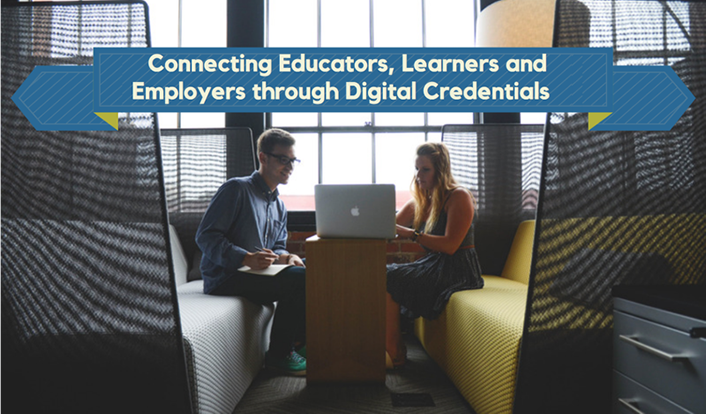
Imagine that your verified skills and abilities can be securely shared with colleagues, admissions offices, and prospective employers with a single click like we share using Google Docs, Dropbox or MicroSoft Cloud. Technology is evolving to the point where your documented competencies and achievements will be much more beneficial than those which can be gleaned today from letter grades and abbreviated class titles on a traditional academic transcript.
Presented digitally, open badges are paving the way for greater and more contextualized information exchange for learners everywhere. As mentioned in an earlier post, these badges contain searchable tags and other rich metadata, and promise to provide an additional way for employers and recruiters to identify prospective employees online who possess desirable skills sets — especially those in quickly changing fields like technology.
In order for these credentials to be both widely accepted and taken seriously, they must be regulated according to some universal standards.
Mark Leuba, VP of Product at IMS Global Learning Consortium, conducted the recent EDUCAUSE Learning Initiative webinar Connecting Educators, Learners and Employers through Open Badges that illuminated this process.
IMS Global Learning Consortium is a nonprofit, member-based collaborative with a mission to improve the learning experience for students, teachers and administrators. The consortium counts institutions, government organizations, and educational suppliers among its approximately 400 members. This variety of constituencies each has its own stake in the development of the field and up until now haven’t had such a diverse forum in which to share ideas, confer on requirements and develop effective, market-based solutions.
Leuba, who co-authored the ELI Brief 7 Things You Should Know About the Evolution of the Transcript, supports a more holistic view of students’ learning experiences through the development of more inclusive frameworks. He also knows that they can’t be built in silos.
“We build connections among educators, policymakers and product suppliers, which lead to improvements in technology usability, interoperability and value,” Leuba said. “IMS supports the smooth management of program and student records which are exchanged between various Student Information Systems, Learning Management Systems, ePortfolios, and so on. In areas of new innovation, there are market leaders — many of them are IMS members — and we work to marshall the momentum they’re building, drawing in other market and institutional participants that want to be an active part of the conversation. We help build critical mass in education technology markets through standards.”
An ongoing dialogue on one of the latest promising innovations is critical to its success. As of January 1 of this year, it was announced that IMS Global is the organization responsible for the advancement of the Open Badges specification based on an agreement with Collective Shift and the Mozilla Foundation, which originally created and developed Open Badges. The aim is to enable a sustainable future for both the technical work and enable community advocacy.
“Open Badges are very exciting and represent a sea-change in how society views credentials,” Leuba said. “Our members bring their badging and digital credentials challenges forward as a natural outgrowth of the different needs and environments in which they operate. We’ve found that standardizing on the ‘data handshake’ is critical in order to effectively connect systems, processes and people.”
For Open Badges, data standards are key to providing learner’s control of their credentials, allowing them to display their badges on any platform that supports the standard. To achieve this credential portability, IMS provides Compliance Certification Services, so suppliers can test their products’ adherence, and then advertise that their product is ‘IMS Certified,’ an essential mark of quality in the edtech market.
Minding such challenges is important. Institutional members have specific privacy and security needs that must be met, as well as existing processes that Open Badges must fit within as part of their overall operations. “Protecting learner’s data and privacy is job one for our members and with IMS’ specifications,” Leuba said.
“IMS enables the fluid exchange of a learner’s credentials, as well as educational program and student data, by facilitating the creation of interoperability standards,” Leuba explained. “Our members work together to define an acceptable standard, so in essence, we’re drawing requirements directly from those in the market.”
This process has successfully produced market-moving standards like LTI (Learning Tools Interoperability), OneRoster and the cloud-enabling learning resources standard, Thin Common Cartridge.
Though the road to a future of secure, web-based sharing of a learner’s digital credentials is long and full of twists and turns, Leuba remains optimistic. “Every day, I am motivated by our members’ laser-like focus on what’s best for their learner’s academic achievement of employability,” he said. Open Badges are entering a new era in 2017. With IMS Global Consortium facilitating the conversation, a variety of experienced perspectives will guide their development.
Kristi DePaul of Founders Marketing provides editorial support and regular contributions to the Transforming Higher Ed column of EDUCAUSE Review on issues of teaching, learning, and edtech.
